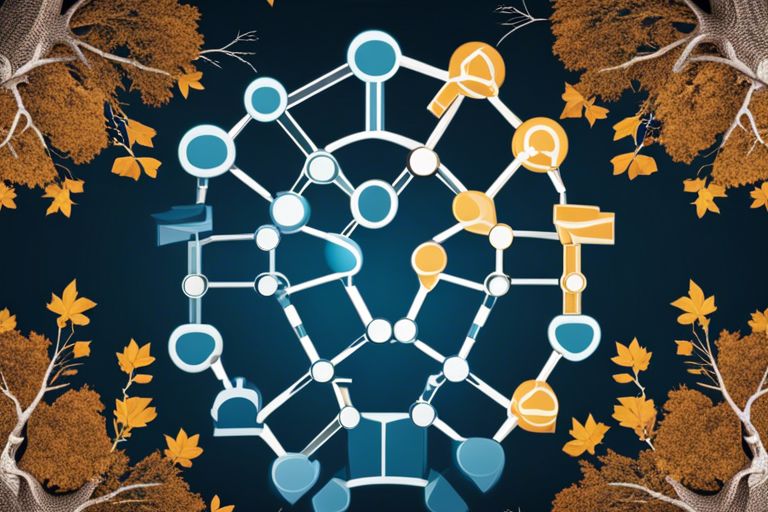Autism spectrum disorder affects millions of individuals worldwide, leading to challenges in communication, social interaction, and behaviour. Research has shown that genetics play a significant role in the development of autism. Studies have indicated that there is a strong genetic component to autism, with a higher risk of inheriting the disorder if a family member has been diagnosed. Understanding the inheritance patterns of autism can provide crucial insight into early detection, intervention, and support for individuals affected by the condition. In this blog post, we will research into the complexities of autism genetics, exploring the potential risks, implications, and advancements in research that shed light on the question, “Can autism be inherited?”
Key Takeaways:
- Genetics play a significant role in autism: Research suggests that autism can be inherited, with genetic factors being a key contributor to the development of the condition.
- Complex inheritance patterns: The inheritance of autism is not straightforward and follows complex patterns. A combination of genetic, environmental, and other factors may all contribute to an individual’s risk of developing the condition.
- Increased risk within families: Families with a history of autism have a higher likelihood of having a child with the condition. This highlights the strong genetic component of autism and the importance of understanding genetic links in its diagnosis and treatment.

The Genetic Basis of Autism
Autism, a complex neurodevelopmental disorder, has long been thought to have a strong genetic component. Research over the years has consistently shown that genetics play a crucial role in the development of autism. Understanding the genetic basis of autism is essential in unraveling the mysteries behind this condition.
Heritability Studies
Heritability studies have indicated that autism has a strong genetic component, with heritability estimates ranging from 60-90%. These studies have shown that autism tends to run in families, with siblings of individuals with autism being at a higher risk of developing the condition compared to the general population. Furthermore, twin studies have revealed a higher concordance rate for autism in identical twins compared to non-identical twins, providing further evidence for the genetic basis of autism.
Genetic studies have made great strides in identifying specific genes that may contribute to the susceptibility of autism. Through techniques such as genome-wide association studies (GWAS) and whole-genome sequencing, researchers have identified a number of autism susceptibility genes that are believed to play a role in the development of the condition. These genes are involved in various biological processes, such as neuronal development, synaptic function, and immune response, providing valuable insights into the underlying mechanisms of autism.
Identification of Autism Susceptibility Genes
One of the key challenges in identifying autism susceptibility genes is the heterogeneity of the condition, with different individuals exhibiting a wide range of symptoms and severity. However, recent advancements in genetic technologies have enabled researchers to overcome this challenge by studying large cohorts of individuals with autism and identifying common genetic variants associated with the condition. By studying these variants, researchers can gain a better understanding of the genetic pathways involved in autism and potentially develop targeted treatments in the future.

Environmental Factors and Their Interplay with Genetics
When it comes to the development of autism, it is essential to consider the role of environmental factors alongside genetics. These external elements can impact gene expression and ultimately influence the likelihood of autism spectrum disorder (ASD) manifesting in an individual.
- Prenatal influences play a crucial role in shaping the neurological development of a foetus. Factors such as maternal health, exposure to toxins, and maternal stress during pregnancy can all contribute to an increased risk of ASD.
- Postnatal factors, including early childhood experiences, diet, and exposure to certain chemicals, can further shape the expression of genetic predispositions towards autism. These environmental influences can either amplify or mitigate the genetic factors underlying ASD.
Prenatal Environmental Influences
During pregnancy, a mother’s health and well-being can have a profound impact on the developing foetus. Research suggests that maternal infections, nutritional deficiencies, and exposure to environmental toxins can all contribute to an increased risk of autism in the child. Genetic vulnerabilities may interact with these prenatal environmental factors, further potentiating the risk of ASD.
Postnatal Environmental Influences
Following birth, a child’s environment continues to play a crucial role in their development. Early interactions with caregivers, exposure to pollutants, and dietary factors can all shape the expression of genetic predispositions towards autism. It is vital to create a supportive and stimulative environment for children with a genetic risk of ASD, as this can positively influence their development.
Knowing the interplay between genetics and environmental factors is crucial in understanding the complex nature of autism spectrum disorder. By recognising and addressing these influences, we can better support individuals affected by ASD and work towards developing targeted interventions that consider both genetic predispositions and environmental triggers.

Genetic Testing and Counseling for Autism
Genetic testing and counselling play a crucial role in understanding the link between genetics and autism spectrum disorder. These services aim to identify genetic variations that may be associated with autism and provide families with valuable information and support.
Types of Genetic Tests
There are several types of genetic tests that can be used to identify autism-related genetic variations. These include chromosomal microarray analysis, whole exome sequencing, and targeted gene panel testing. Each test has its own benefits and limitations, and the choice of test depends on the specific needs of the individual or family. Genetic testing can help identify genetic causes of autism, which is crucial for early intervention and treatment.
| 1. Chromosomal Microarray Analysis | Identifies copy number variations in the chromosomes |
| 2. Whole Exome Sequencing | Sequencing of all protein-coding regions of the genome |
| 3. Targeted Gene Panel Testing | Focuses on specific genes known to be associated with autism |
| 4. Benefits | Early identification of genetic causes for targeted intervention |
| 5. Limitations | Costly and may not identify all genetic variations |
Role of Genetic Counseling for Families
Genetic counselling for families of individuals with autism is essential for providing emotional support and helping them understand the implications of genetic test results. Genetic counsellors are trained professionals who can interpret the test results, explain the complex genetic information in a clear manner, and provide guidance on the next steps to take.
Furthermore, genetic counselling can empower families by helping them make informed decisions about healthcare options, educational strategies, and family planning. Thorough counselling sessions can also address any concerns or fears that families may have about the genetic implications of autism within their family.
Future Directions in Autism Research
Advances in Genetic Technology
In recent years, there have been significant advances in genetic technology that have revolutionised our understanding of autism spectrum disorder (ASD). The development of high-throughput genetic sequencing techniques has enabled researchers to identify specific genetic variations associated with autism. This has allowed for the discovery of hundreds of genes that may play a role in the development of ASD.
Moreover, the ability to analyse large-scale genetic data sets has provided researchers with a more comprehensive view of the genetic architecture of autism. This has paved the way for the development of personalised treatments based on an individual’s genetic profile, marking a significant step towards more targeted therapies for autism.
Integrating Genetics with Autism Therapies
Integrating genetics with autism therapies represents a groundbreaking approach in the treatment of ASD. By understanding the genetic underpinnings of autism, researchers and clinicians can tailor interventions to target specific genetic pathways implicated in the disorder. This personalised approach holds immense promise for enhancing the effectiveness of existing therapies and developing novel treatments for autism.
Furthermore, leveraging genetic data in conjunction with behavioural and cognitive therapies can lead to more tailored interventions that address the individual needs of people with autism. This holistic approach has the potential to improve outcomes for individuals on the autism spectrum and maximise their quality of life.
The Role of Genetics – Can Autism Be Inherited?
To sum up, research strongly suggests that genetics play a significant role in the development of autism spectrum disorder. While there is no single gene responsible for causing autism, studies have shown that there is a hereditary component to the condition. It is likely that a combination of genetic factors, along with environmental influences, contribute to the risk of inheriting autism. Understanding the genetic basis of autism can help improve early diagnosis and intervention strategies for individuals with this condition. Further research in this area is crucial to elucidate the complex interplay between genetics and environmental factors in the development of autism.
FAQ
Q: What is Autism?
A: Autism, or autism spectrum disorder (ASD), refers to a range of conditions characterised by challenges with social skills, repetitive behaviours, speech and nonverbal communication.
Q: Can Autism be inherited?
A: Yes, research suggests that there is a genetic component to autism, meaning it can run in families.
Q: How strong is the genetic influence on Autism?
A: Studies indicate that genetics play a significant role in determining the risk of developing autism, with heritability estimates ranging from 50-90%.
Q: Are there specific genes associated with Autism?
A: While specific genes linked to autism have been identified, it is believed that there are likely many different genes involved in the development of the disorder.
Q: Can environmental factors also contribute to Autism?
A: Environmental factors may play a role in conjunction with genetic predispositions, but the exact interactions between genetics and the environment in relation to autism are still being studied.
Q: Does having a family member with Autism increase the risk for future generations?
A: Yes, having a first-degree relative with autism, such as a sibling or parent, increases the likelihood of autism in future generations.
Q: How can understanding the role of genetics help in the treatment of Autism?
A: Understanding the genetic basis of autism can lead to more targeted and effective treatment strategies, as well as advancements in early diagnosis and intervention.







